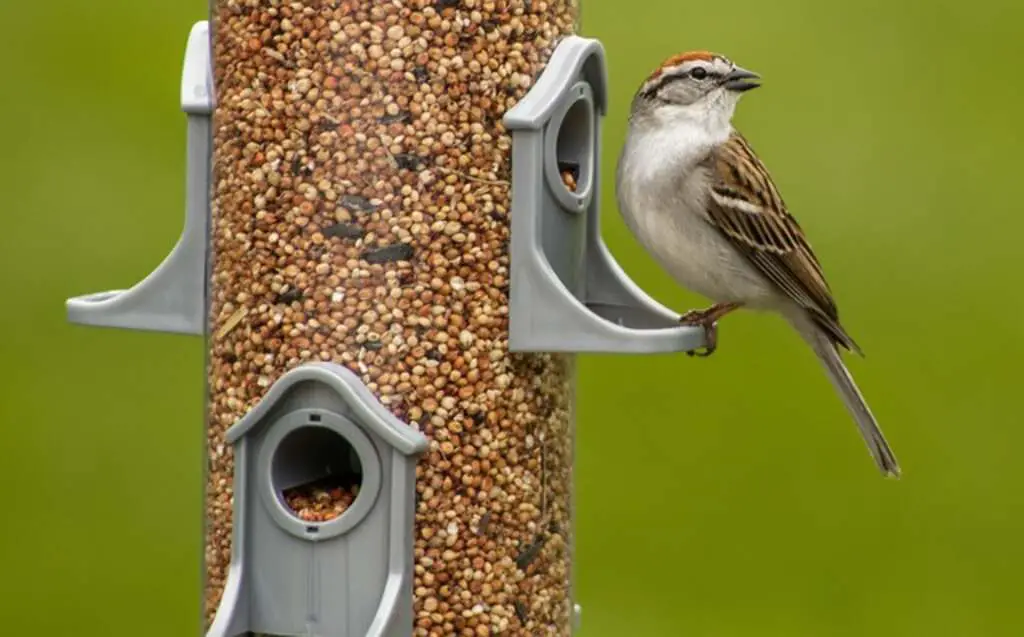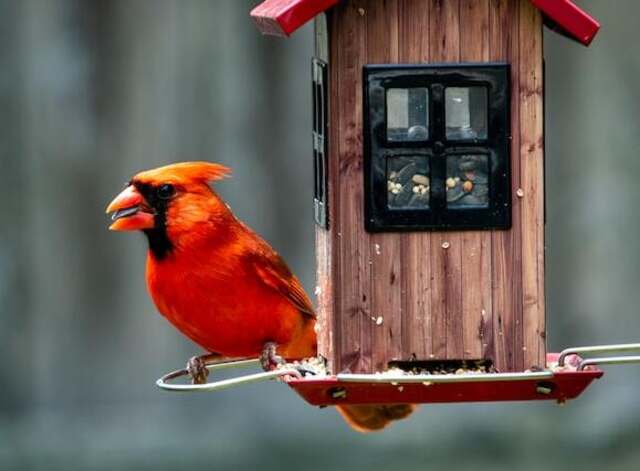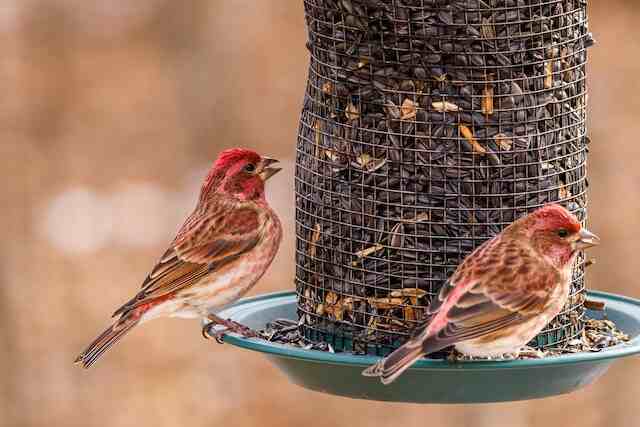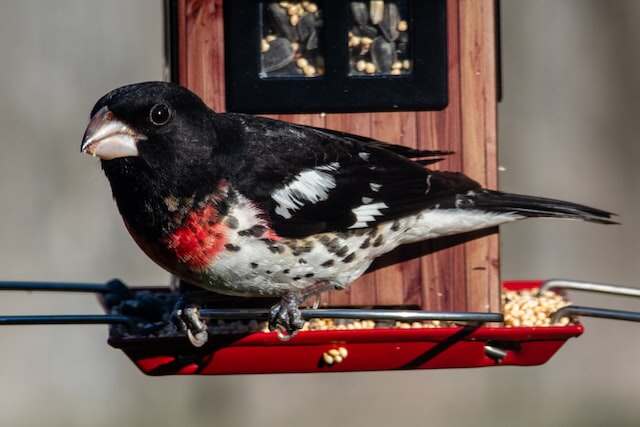Ever found yourself staring at an almost empty bird feeder and wondered, how much birdseed can a bird actually eat in a day? While the answer depends on the type of bird, most small birds nibble on about a quarter to half an ounce daily. Bigger birds like cardinals can eat up to an ounce or more! Want to know how to keep your feeders stocked without overfeeding? Keep reading to get the expert guide.
Table of Contents
How Much Birdseed Can A Bird Eat Per Day?
The amount of food that a bird can eat per day varies depending on various factors such as the species, size, and activity level. As a general rule, birds can consume approximately 10% to 30% of their body weight in food each day, including seeds, insects, and other types of food.
However, this can vary significantly depending on the bird species and other factors. It is important to provide birds with a balanced diet that meets their nutritional needs and to avoid overfeeding them.
Factors that affect a bird’s food intake
- Species of Bird: Birds have evolved to have specialized diets that meet their specific nutritional needs. For example, birds that feed on insects require a diet that is high in protein to promote muscle development and egg production. Seed-eating birds require a diet that is high in fat to fuel their high metabolic rate. It’s essential to understand the dietary requirements of different bird species to ensure that they receive the proper nutrition.
- Age of the Bird: The age of the bird can also influence its food intake. Young birds require a diet that is high in protein and fat to support their rapid growth and development. As they mature, their dietary needs change, and they require a diet that is lower in calories to maintain their body weight.
- Time of Year: Birds’ food intake can vary depending on the time of year. During the breeding season, birds require a high-protein diet to promote egg production and feed their young. In the winter, birds require a high-fat diet to maintain their body temperature and energy levels. The availability of food sources can also vary depending on the season, which can affect a bird’s food intake.
- Availability of Other Food Sources: The availability of other food sources can influence a bird’s food intake. Birds will consume less birdseed if they have access to other food sources, such as insects or fruit. Providing a variety of food sources can encourage birds to forage and reduce their reliance on birdseed.
- Health and Activity Level of the Bird: A bird’s health and activity level can affect its food intake. Sick or injured birds may consume less food than healthy birds. Additionally, birds that are less active may require less food than birds that are highly active.
* Understanding the various factors that affect a bird’s food intake is crucial for providing proper nutrition and avoiding overfeeding. By providing a varied diet that meets a bird’s specific dietary needs, we can help ensure that they stay healthy and thrive in their environment.
Recommended Daily Amount of Birdseed
Feeding birds can be a delightful experience, but it is crucial to understand how much birdseed a bird can eat per day. Providing an appropriate amount of food is essential to maintain the bird’s health and avoid overfeeding. Below are some general guidelines and recommendations for different species of birds.
General Guidelines for Birdseed Consumption
Birds require a diet that is high in protein, carbohydrates, and fats. In general, a bird should consume approximately 10% of its body weight in food per day.
However, this can vary depending on the bird’s size, activity level, and age. It is recommended to provide small portions of birdseed and refill the feeder once it is empty.
Leaving too much food in the feeder can cause the seed to become stale or moldy, which can be harmful to the bird’s health. Moreover, providing fresh water is equally important to ensure that the bird stays hydrated.
Recommended Amounts for Different Species of Birds
Different species of birds have different dietary requirements. Therefore, it is essential to provide the appropriate food for each bird species. Here are some recommended amounts of birdseed for some common bird species:
| Bird Species | Recommended Amount of Birdseed per Day |
|---|---|
| American Goldfinch | 1/4 cup |
| Blue Jay | 1/2 cup |
| House Sparrow | 1/4 to 1/3 cup |
| Mourning Dove | 1/4 to 1/2 cup |
| Northern Cardinal | 1/2 cup |
| Black-capped Chickadee | 1/4 cup |
| Tufted Titmouse | 1/4 cup |
| Dark-eyed Junco | 1/4 cup |
| American Robin | 1/4 to 1/2 cup |
| European Starling | 1/2 cup |
- Remember that these are general recommendations, and the amount of birdseed required can vary depending on the bird’s age, activity level, and time of year.
Signs of Overfeeding in Birds
Obesity
Obesity is a common problem in pet birds and wild birds alike. The primary reasons for obesity in birds are excessive feeding and insufficient physical activity. When a bird consumes more calories than it needs, the excess energy is stored as fat, leading to weight gain.
Obesity can cause many health problems, such as liver disease, heart disease, and joint problems. Obese birds may also have difficulty flying and breathing, leading to a decreased quality of life.
Unhealthy Plumage
A bird’s feathers are a crucial indicator of its health. Overfeeding can lead to the production of excessive oil in the bird’s skin, leading to greasy, unkempt feathers. The excess oil can also attract dirt and dust, making the bird’s feathers appear dull and dirty.
In extreme cases, overfeeding can also cause feather plucking, which is a behavioral disorder that leads to the bird pulling out its own feathers.
Decreased Activity Levels
Birds need to be active to maintain their physical and mental well-being. Overfeeding can lead to lethargy and a decrease in physical activity.
The bird may spend more time sitting in one place, which can lead to muscle wasting and weakness. A lack of physical activity can also lead to depression and anxiety in birds.
Health Problems
Overfeeding can cause a range of health problems in birds. For example, it can lead to fatty liver disease, a condition where the liver becomes overloaded with fat. Fatty liver disease can be fatal if not treated promptly. Overfeeding can also lead to kidney disease, gout, and other health problems.
* Overfeeding birds can lead to several health problems that can affect their quality of life and lifespan. It’s crucial to monitor a bird’s food intake and ensure that it’s getting a balanced diet. If you notice any signs of overfeeding in your bird, it’s essential to take action promptly to avoid any long-term health problems.
Tips for Feeding Birds
Feeding birds can be a delightful experience for bird watchers and nature enthusiasts alike. However, feeding them requires proper care and attention to ensure that they are receiving a well-balanced diet without overfeeding. Here are some tips for feeding birds in your backyard:
Choose high-quality birdseed
The quality of the birdseed can affect the overall health of the birds. It’s important to choose high-quality birdseed that is free from debris, mold, and pests. Avoid seed mixes that contain filler ingredients such as milo or wheat, as they are not preferred by most birds.
Instead, choose a seed mix that contains a variety of seeds such as sunflower seeds, nyjer seeds, and safflower seeds. These seeds provide a good balance of protein, fat, and carbohydrates, which are essential for a bird’s health.
Backyard Bird Information Tool
Use this tool to learn more about common backyard birds. Select a species from the drop-down menu to see information about the proper feeder and food type, as well as some interesting facts about the bird.
| Feeder | |
|---|---|
| Food | |
| Facts |
Provide a variety of food sources
Birds require a varied diet to meet their nutritional needs. In addition to birdseed, consider offering other food sources such as suet, mealworms, and fruits.
Suet is a high-energy food that can be particularly beneficial for birds during the winter months when food is scarce.
Mealworms are an excellent source of protein, and fruits such as apples and berries can provide vitamins and antioxidants.
Read more: How To Attract Birds To A New Bird Feeder? Expert Tips!
Clean feeders regularly
Dirty bird feeders can harbor bacteria and mold, which can be harmful to birds. It’s essential to clean bird feeders regularly to prevent the spread of disease. Use a mild soap and water solution to clean the feeder thoroughly, and rinse it well before refilling it with fresh birdseed.
Monitor the amount of food being consumed
It’s crucial to monitor the amount of food being consumed by birds to ensure that they are not overeating. Overfeeding can lead to health problems such as obesity and fatty liver disease.
One way to monitor the amount of food being consumed is to refill the feeder with small amounts of food at a time. This will allow you to keep track of how much the birds are eating and adjust the amount of food accordingly.
Observe the birds to ensure they are healthy and active
Feeding birds provides an excellent opportunity to observe their behavior and health. Birds that are healthy and active will have bright and clean plumage, and they will be vocal and alert.
If you notice any birds that appear sick or inactive, it’s essential to remove the food source immediately to prevent the spread of disease.
* By choosing high-quality birdseed, providing a variety of food sources, cleaning feeders regularly, monitoring the amount of food being consumed, and observing the birds to ensure they are healthy and active, you can help ensure that your feathered friends stay healthy and happy.
Conclusion
Feeding birds can be a rewarding experience, but it’s important to do it responsibly. By understanding how much birdseed a bird can eat per day and following the recommended guidelines, we can help ensure that our feathered friends stay healthy and happy.
Related Posts:





